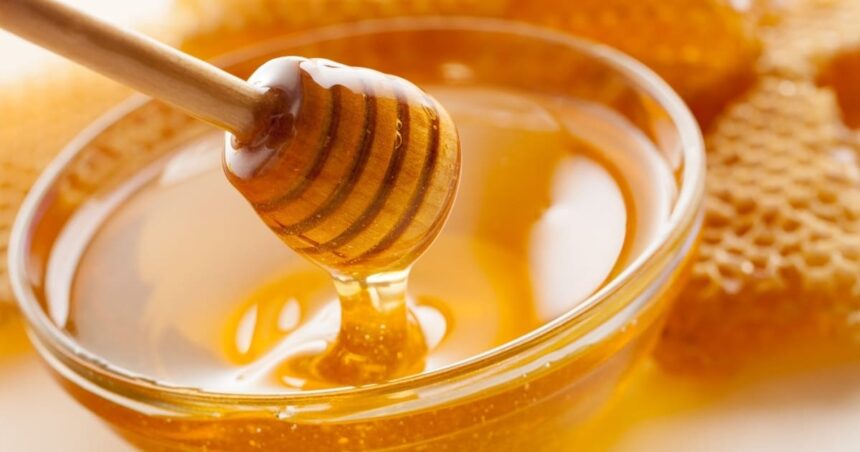For thousands of years, humans have been eating and using honey as a medicine. The first record of organized beekeeping and honey dates back to ancient Egypt in 500 BC, creating the first and most reliable sweeteners of man.
Today, honey is consumed worldwide and is touted for its natural taste, health benefits and sweetness. But is honey good for people with diabetes?
This article explains the health benefits of eating honey, the pros and cons of eating honey, and how to incorporate (and) honey into your diet.
What is honey?
Honey is a rich, golden liquid produced by honeybees from nectar collected from flowering plants.
Many people who eat plant-based diets do not consider this food vegan, as honey cannot exist without the honeybee producing it from nectar collected from the flowers.
Unlike cane sugar, which tastes the same everywhere, honey is very versatile and can taste very differently depending on the region and local flora. There are over 300 types of honey in the US alone.
One tablespoon of honey (21 grams) contains 64 calories and 17 grams of sugar, and is virtually free of protein, fiber or fat.
How honey affects blood sugar levels
Honey is the natural form of sugar, and like all sugar, its natural job is to raise blood sugar levels.
Honey has a lower glycemic index (GI) than sugar, but the difference is very small (58 for honey vs. 60 for sugar). The blood glucose index measures how quickly carbohydrates increase blood glucose levels.
This means that if you live with diabetes and eat honey, you have a risk of hyperglycemia, so make sure you properly check your measurements, carbohydrate counts, and insulin (or other diabetic drugs).
It may cause higher blood sugar, but honey can be used as an excellent hypoglycemic snack (don’t overdo it!).
Is honey different from other sweeteners?
Honey is a supersaturated sugar solution containing approximately 17.1% water. Fructose is 38.5% of the main sugar followed by 31% glucose.
The main difference between honey and sugar is that honey also contains vitamins and minerals such as potassium, calcium, zinc, vitamin C and antioxidants.
So honey affects blood sugar levels just as much as regular sugar, but has a slightly better overall health profile.
If you’re looking for sweeteners that don’t affect your blood sugar levels and will have minimal impacts, you can choose from this list of the best sweeteners for people with diabetes.
Honey’s health benefits
There are an astounding number of health benefits that can be obtained from consuming honey regularly.
It has bioactive plant compounds and antioxidants
Compared to table sugar, which lacks nutritionally benefits, honey contains many naturally occurring bioactive plant compounds and antioxidants such as flavonoids, and contains the highest coloured honey varieties.
Studies show that buckwheat honey actually increases antioxidant levels in human blood!
An antioxidant-rich diet has been associated with a lower risk of heart attacks, strokes and cancer, and has even been shown to improve eye health.
Honey also contains intibin, which is rich in vitamin B, amino acids, and antibiotics, and protein. The following vitamins and minerals can be found in trace amounts in honey:
- Niacin
- Pantothenic Acid
- calcium
- magnesium
- Riboflavin
- manganese
- potassium
- zinc
- Lin
The most abundant sugar in honey is fructose, which is rich in energy and sweeter than artificial ingredients, making it a great snack to treat hypoglycemia.
It may be helpful for allergies
Research on this is mixed, but if someone is struggling with seasonal allergies from the grass or flowering plants in the area, taking local honey is thought to help the system adapt to the local flora and pollen and alleviate allergic symptoms.
One study found that eating honey in large quantities can help alleviate seasonal allergies around eight weeks.
However, another study comparing pasteurized honey with local honey compared the effects on population allergy and found no significant differences.
If you’re struggling with seasonal allergies and have a honey taste, it’s not harmful to try this treatment!
Promotes wounds and burns healing
Topical use of honey has been a common medicinal practice since ancient Egypt. One meta-analysis found that honey is extremely effective in healing partially thick burns and infected wounds after surgery.
Honey is also an effective local treatment for foot ulcers in diabetics. Another study found that topical honey treatment for diabetic foot ulcers is a therapeutic treatment in 97% of patients!
Honey can also treat everything from common skin rashes to psoriasis and even herpes. This is due to the natural antibacterial and anti-inflammatory properties of honey.
Effective cough suppressant
The soothing properties of honey when you are sick have been proven scientifically! Compared to two over-the-counter cough medications, we found that honey is more effective in helping relieve cough and sore throats.
In this study, honey was particularly useful in reducing the frequency of cough, the severity of cough, and improving the quality of sleep in children and parents with sore throats and coughs.
Another study supported their findings. However, please note that honey should never be given to children under one year of age due to the risk of botuhrism.
Lower triglycerides
Several studies have shown that honey intake lowers triglyceride levels. High triglyceride levels are associated with increased risk of insulin resistance, type 2 diabetes, and heart disease.
When used in place of sugar, honey consumption is associated with lower triglyceride levels.
Another study found that participants who ate honey instead of sugar could drop their triglyceride levels by up to 19%.
The disadvantages of eating honey
Honey may seem like a healthy food, but it also has a distinct drawback to regular consumption.
Weight gain
Honey is not a low-calorie food and does not have any fiber, fat, or protein that you will get tired of.
Honey is usually eaten with other foods (oatmeal, fruits, toast, etc.). Therefore, adding large amounts of honey to your daily diet will quickly result in calorie surplus and more likely to suffer from weight gain.
One tablespoon of honey has 64 calories, so if you’re looking at your weight, make sure you’re limiting your intake.
It can cause infant botuhrism
Honey may contain bacteria that can cause botulinum poisoning in babies under the age of 1. This is why it is not recommended for young children under 12 months of age.
When voturism spores are discovered in honey and swallowed, the spores release toxins that the infant’s immune system is too immature and can become very sick to combat properly.
To find out more information on the prevention and treatment of infant botulinum, please see here.
Cavity
Like all sweets, eating too much honey can lead to tooth decay and periodontal disease, especially if you consume it before bed without brushing your teeth.
Be careful when treating nighttime hypoglycemia with honey. If you like eating honey but want to prevent cavities, talk to your dentist about the appropriate methods to care for your teeth and gums.
If you are struggling with the cavity, you can choose a sugar-free sweetener instead of honey to add it to your tea, coffee or to your daily life.
Make it easy to do too much
Honey has no fiber, fat, or protein and has a very sweet and delicious taste, so you can easily overdo it, so you need to pay attention to the right portion size.
One meal of honey is 1 tablespoon, but you can eat three or four times more on one sitting!
Honey has many healthy properties, but be careful to eat it moderately, as eating too much can lead to problems.
Make sure you’re eating only pure honey, as many brands can add table sugar or cheap syrup to create a “blend” without any health benefits.












